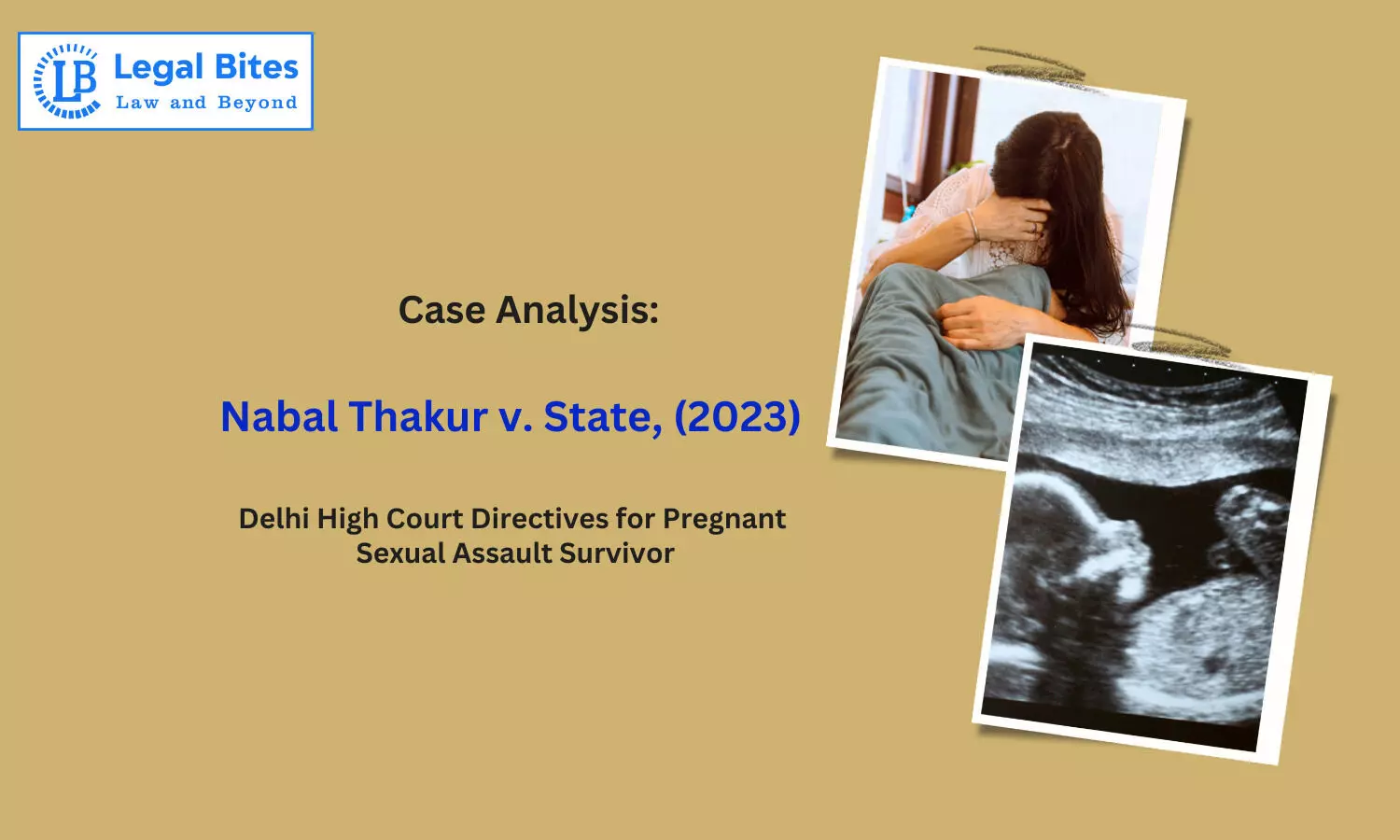Case Analysis: Nabal Thakur v. State, (2023) | Delhi High Court Directives for Pregnant Sexual Assault Survivor
Hon’ble Court has issued a commendable direction for expeditious pregnancy termination within twenty-four hours of order, which was much needed in the present-day scenario.;

The 'Case Analysis: Nabal Thakur v. State' highlights the decision of the Delhi High Court while hearing a bail application of an individual accused of assaulting a minor, addressed the challenges faced by the survivors of sexual assault, and issued a set of guidelines for doctors as well as the authorities, in order to ensure that such survivors are provided with appropriate treatment and care.
Apart from the same, the Hon’ble Court also issued directions to the Ministry of Health and Family Welfare for dissemination of SOP (Standard Operating Procedure) with regard to the termination of pregnancy and preservation of the foetus emphasizing the urgency of such cases.
Case Title: Nabal Thakur v. State
Court: Delhi High Court
Citation: Bail Application 2128/2023
Judges: Justice Swarana Kanta Sharma
Date: 9th August 2023
Brief Facts of the Case
A complaint was lodged by the father of the prosecutrix that his daughter had gone missing, however, about two months later i.e., on 30.01.2021, the father produced the prosecutrix before the investigating officer and a medical examination of the prosecutrix was conducted thereafter at Deen Dayal Upadhyay Hospital, Harinagar, Delhi. It was found after analyzing reports of the medical examination that the UPT (Urine Pregnancy Test) of the prosecutrix was positive and the minor prosecutrix was pregnant.
During the Medico-Legal Case (MLC) of the prosecutrix, she stated that the accused/bail applicant established non-consensual physical relations, and pursuant to her statement recorded under Section 164 of the Code of Criminal Procedure,1973, the accused was arrested.
The prosecutrix was then produced before the CWC (Child Welfare Committee) and the CWC accorded the permission for the termination of pregnancy and a charge sheet was filed by the Police as per Sections 363, 366 and 376 of Indian Penal Code,1860.
Contentions of the Parties
While the accused pleaded that the statement of the prosecutrix had material contradictions while the same was recorded during medical examination and before Ld. The Trial Court and the medical examination were not done properly, per contra, the State pleaded that the allegations against the accused are grave in nature and the examination establishes the involvement of the accused in the instant case.
Judgment & Findings of the Court
The Hon’ble Court while disposing off the instant application held that it is evident from the facts and circumstances that the minor prosecutrix was repeatedly raped and conceived due to the same and no ground for granting bail to the accused can be maintained at this stage.
However, the Hon’ble Court also raised certain concerns with regard to the examination of the prosecutrix in the instant case:
1) After being mentioned during the MLC that the duration of pregnancy is four months and five days on 31.01.2021, the prosecutrix was admitted and discharged several times. However, the termination of pregnancy did not take place, and neither did the prosecutrix was informed reason for being discharged and what can be the dangers associated with losing the foetus.
2) Despite a clear order dated 04.02.2021 by the CWC, for termination of pregnancy and preservation of foetus, the prosecutrix was kept admitted till 23.02.2021 without terminating the pregnancy, and the foetus, which was a crucial piece of evidence, was not preserved owing to the reason that the prosecutrix suffered abortion of foetal tissues expelled at home.
3) There is evident negligence on the part of the concerned doctors since they did not comply with the order passed by CWC with care, and neither did they disclose the treatment that was administered to the prosecutrix in the discharge summary.
Pursuant to such concerns, the Hon’ble Court has issued certain directions pertaining to the cases that involve medical termination of pregnancy of sexual assault victims as under:
1) The Ministry of Health and Family Welfare, Government of India, and the Department of Health and Family Welfare, Government of NCT of Delhi, were directed to issue guidelines and standard operating procedures for examination involving medical termination of pregnancy of sexual assault victims, and shall also issue the additional directions which shall be added to existing standard operating procedures.
2) It was directed that the Investigating Officers shall refer the victim for termination of pregnancy within twenty-four hours of passing the order for such termination by the Superintendent.
3) The concerned doctors were directed to ensure that the victim is not discharged in a hurry and that the foetus is preserved after termination of pregnancy.
4) It was also directed that the concerned doctor shall furnish the reason for such discharge if the victim is being discharged without termination of pregnancy.
5) Addressing the problems faced by the Courts in comprehending the handwritten MLC due to illegibility, the Court directed that the typed copy of the MLC shall be filed and such typed copy shall be sent to the Investigating Officer in soft copy.
It was further clarified by the Hon’ble Court that directions issued through this judgment will be read in addition to the guidelines issued by the Hon’ble Supreme Court in the case of “Minor R Through Mother H v. State of NCT of Delhi, W.P. (CRL.)221/2023” which was decided on 25.01.2023.
Conclusion
The Hon’ble Court has dealt with one of the most significant legal topics which will have a direct impact on the victims of sexual assault, by highlighting the key concerns which arise in sexual assault cases and issuing necessary directions in this regard. Amongst others, the Hon’ble Court has issued a commendable direction for expeditious pregnancy termination within twenty-four hours of order, which was much needed in the present-day scenario.
References
[1] Indian Penal Code, 1860, Available Here
[2] The Code of Criminal Procedure, 1973, Available Here

